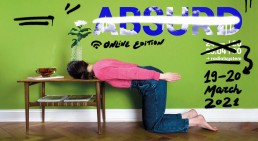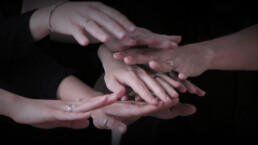/ENDING_REBIRTH_GROWTH/
7th Edition
It is the last of the ID Festival editions. After edition #7, the journey will be complete.
Seven has had a cultural significance since the dawn of times. Four thousand years ago, in Mesopotamian culture, Seven was considered to be mystical. In ancient Egypt there were seven paths to heaven and seven heavenly cows, and Lord Osiris led his father through the seven halls of the underworld. Pythagoras, the father of mathematics and numerology, considered Seven as the most spiritual of all numbers.
In Judaism, Seven holds such great significance that the Jewish people were nicknamed “the nation that sanctifies the Seventh.” The list of things which are expressed through the number Seven is indeed, incredibly vast. Building on Judaism, Christianity kept most of these things, and added the seven deadly sins. The Islamic Koran speaks of seven heavens and pilgrims circumambulate Islam‘s most sacred site in Mecca, seven times. There are also seven higher worlds and seven underworlds in Hindu culture, and in Buddhism, baby Buddha rises and takes seven steps. Confucianists regard Seven as a representation of harmony, encompassed by yin, yang, and the five elements, and in Japan, it is associated with the Seven Gods of Luck. Speaking of luck, hitting 777 on slot machines in Vegas means ‘jackpot.’ There are the seven wonders of the world, seven notes in the do-re-mi scale, seven continents and seven seas, and ROYGBIV make the seven colors of the rainbow.
Seven is now also associated with October. The events of October 7 reminded us that certain things in life, and above all life itself, are finite. We have been forced to grapple with this concept far too many times recently: first with Covid, then the ongoing war in the Ukraine. Now, the terror attack of the Hamas on October 7 and the ensuing war provide another vivid cue to the veracity of the fact.
Unaware, we faced different endings, many of them quite fearsome. Last year, people feared seeing the end of Israel as a democracy. On October 7, we were terrified at the prospect of the annihilation of the Jewish state itself, with all its potential outcomes and implications on Jews worldwide. It wasn’t far from happening, and at the time of writing this text, danger remains imminent.
These are extreme circumstances, and the art – which is often viewed as a mirror to life and thus artists are expected to react and respond to real-life occurrences – in extreme circumstances we are led to ask whether art is the appropriate medium for a response.
The last edition of the ID Festival starts by posing this question. The October 7 attack by the Hamas evoked the collective trauma of the Holocaust, and to begin this year’s program, two events react to two collective traumas: ‘writingSITUATIONs’ asks how authors can write after October 7, and BECOME CHOIR challenges Adorno’s verdict that no poetry could be written after Auschwitz.
On the second day, we zoom in on Israeli politics through satirical means, with arguably the most scandalous piece in Israeli theatre history. The brilliant cast of Jaffa Theatre presents a fresh interpretation of Hanoch Levin’s seminal work, ‘SHAMPOO QUEEN’. Fifty years separate the work’s premiere from our German premiere. One cannot help but reflect on how history resonates; among the militants and nationalists in Israeli society, the air of smugness, akin to the days leading to the Yom Kippur attack of 1973, prevailed again in Israel of pre-October 2023. Assessment errors and misjudgments of the high-ranking figures in Israel’s military and political leadership, the intelligence, and the government—all echo through time. It feels like there is more to ‘scrub off’ with Levin’s ‘Shampoo’ now.
Questioning democracy’s resilience, as well as probing the complex dynamics still forming between human and artificial intelligent forms, takes center stage in ‘Smoke and Mirrors’, an exhibition open to visitors on all festival days.
The air will start clearing on the festival’s third day. After all, it is our last edition and we want to conclude the journey on a positive note. Although centered on endings, we will argue that an ending isn’t necessarily a finite thing; instead, we want to reframe ‘endings’ as potential for positive change. For instance, ARETZ postulates a different ending to Herzl’s vision for a Jewish state. ‘If you will it, it is no dream,’ is the famous quote from Herzl’s seminal work, ‘Alt-Neuland.’ Sadly, only a few have delved into the rest of this quote, as with the rest of Herzl’s writings. The theoretical graphic novel, ARETZ, may shed new light on the case.
Later that night, we will celebrate multi-national understanding in MIRI BEN-ARI: SYMPHONY OF BROTHERHOOD – a triad of tolerance among German, Black, and Jewish peoples. Following the extravagant highlight featuring a 50-voice gospel choir, music band and soloists and one Grammy-award winning violinist, we will seamlessly transition into an exciting Open Stage event, ‘LIGHTS OUT?’. The showcased acts will be curated specifically for you by our team of experts, who will have selected from the many submissions we received in our open call. We invited artists of any field, background, or nationality to submit their suggestions and be part of ID Festival before the lights go out.
On Sunday, we conclude by making peace: peace with ourselves, our souls and minds; peace with our neighbours; and peace with the world and the reality we live in. Playback Theatre, an engaging format, invites the audience to witness and relive their real past situations and to reflect on their own memories and experiences, be they invigorating, challenging or even traumatic. These moments unfold before their eyes through the artistry of a group of Playback Theatre professionals. We will then bring our seventh and final festival edition to a close with a musical healing circle, inviting everyone to join in and together reach a high note in SACRED RIVERS.
This is perhaps a good place to end, but not before saying some thank-yous:
First and foremost, I must thank former MP Rüdiger Kruse, without whose initiative and support ID would never have come into existence. I am also thankful for Katharina and Ingo who helped get the project off the ground. Thanks to my wife and muse, Anastasia, my partner for everything, including this text. From the journey’s beginning you are my pillar of strength and unwavering support.
A sincere thank you to the festival’s sponsors, and anyone who has supported the festival; to our partners and media-partners; the supportive music department at BKM; our amazing venue and partner, Radialsystem, its managers and everyone on its team; to the 500+ artists, performers and participants, who have graced the ID stages; all the past and present ID Festival team members who have worked tirelessly to bring the editions to life; and last but not least, to all the visitors who have attended our events.
Thank you, and look forward to seeing you at the festival!
~ Ohad Ben-Ari, Founder & Artistic Director
Our History
ID Festival was founded in 2015 with the aim to serve as a platform for Israeli artists to showcase their works to local audiences. The “Israel-Deutschland” festival highlights the connection between the “I” and the “D” of its acronym as a paradigm of hope, change, tolerance and understanding. It fosters collaborations between Israeli artists and local artists and art institutions, with further focus on building bridges with other minority groups in Germany.





